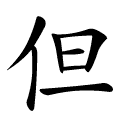但
- only;
- merely;
- but;
- however;
Etymology
Phono-semantic character:
人 (사람 인) — indicates relation to a person or human matter.
旦 (아침 단) — provides the pronunciation dan and originally “dawn.”
Thus the sense: “a person at dawn - only / merely” (in older uses). Some sources suggest the original meaning of 但 was “bare‐chested” (裸裎) or “to bend” before becoming a conjunction meaning “but / only.”
Usage in Korean
단지 (但只) — merely, just.
단연 (但然) — surely; certainly (though less common).
Words that derived from 但
Additional notes
According to the classical dictionary 說文解字 (Shuowen Jiezi) by 許慎:
「但,裼也。從人,旦聲。」 【卷十三下】
This states that 但 originally meant “裼” (to bare the upper body) and is composed from 人 (person) and phonetic 旦 (dawn / morning).
In modern grammar explanation (albeit non-ancient) we find:
“不但貴,而且難買。” — 這個東西不但貴,而且難買。 (“This thing is not only expensive, but also hard to buy.”)
This shows the usage of 不但 … 而且 … pattern, where 但 appears as part of the limiting conjunction “not only … but also”.
Originally 但 had a sense related to a person’s bare or exposed upper body (裼), as the Shuowen Jiezi entry shows. Over time the meaning shifted from literal to abstract: from bare / only to just; merely; however.
As documented, today the character functions primarily as a conjunction of limitation or exclusivity (only/just) and as an adversative conjunction (“but; however”).
The transition from concrete to abstract meaning is typical of many Chinese characters: concrete physical sense → figurative and grammatical use.
In the discussion of conjunction development in Chinese, scholars note that words like 任, 但, 令 evolved from verbs to conditional/limiting conjunctions.
So 但 may be part of that broader grammaticalization process of lexical items into conjunctions.
